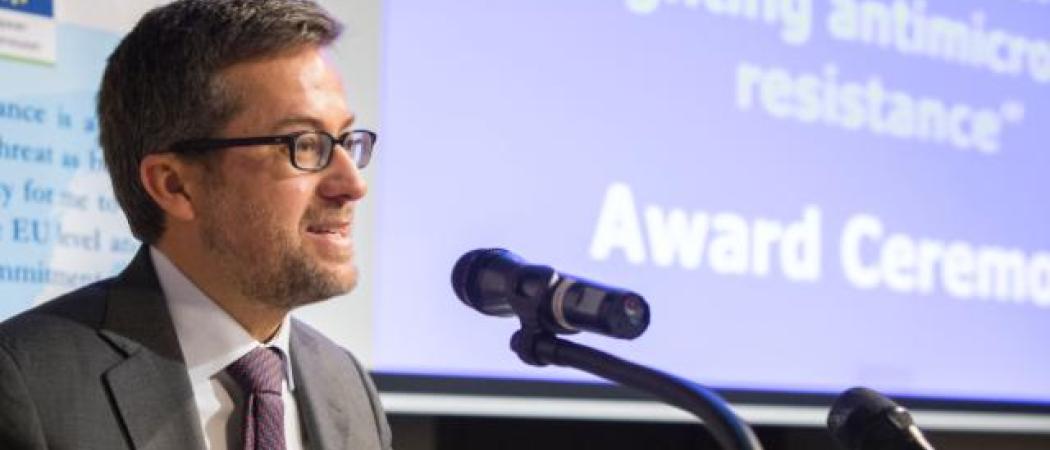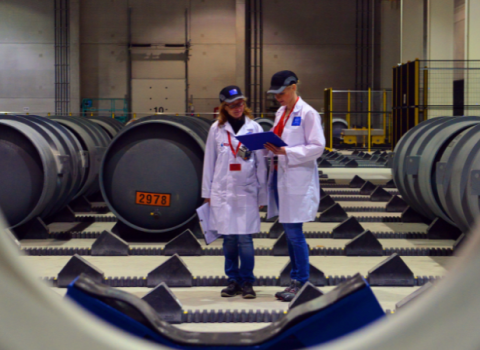Europe trails rivals in the battery wars. ‘We have a shortage of batteries and we can’t wait long years to catch up,’ warns Commission vice-president. Advisers, in new report, say it's not the only manufacturing gap that needs plugging

Research commissioner Carlos Moedas
The European Commission Friday launched a new €10 million prize competition to create a cheaper, lighter battery that would help usher in a cleaner, more efficient energy system.
The prize, which like old Wild West reward posters invites enterprising people to join a particular search, will go to a prototype that can power an electric vehicle with similar performance in terms of range and charging time as a conventional petrol or diesel powered small family vehicle. The deadline for entry is December 2020.
“We won't ask ‘the how’ or ‘the who’,” research commissioner Carlos Moedas explained at an industry event in the Crowne Plaza. “The winner will be the one who thinks outside the box and who best meets the challenge.”
Today’s batteries account for up to half the total cost of electric vehicles, which won’t be able to gain competitiveness with their conventionally powered – and less environmentally friendly – equivalents until the price of battery packs drop.
For this reason, securing next generation battery supplies has become a big political target in Brussels and the large prize on offer – which is in fact the biggest sum the EU has ever offered for an innovation – underscores the concern that Europe is trailing its rivals in the battery wars.
“We have a shortage in Europe and we can’t wait long years to catch up,” said Maroš Šefčovič, vice-president of the European Commission, in charge of Energy Union.
A prized approach
While prizes competitions are anything but new, they represent a growing part of the Commission’s funding arsenal. Other prizes are being offered for new blockchain technology and ideas to drive down the cost of space launches.
Offering prizes for challenges – as opposed to awarding prizes such as the Nobel, Lasker or Kavli awards for a body of scientific work – dates back more than 300 years. In 1714, the UK government offered a then-substantial inducement of £20,000 under a special Act of Parliament, to anyone who could help measure ships’ longitude. Later that century, Napoleon Bonaparte offered a 12,000F prize to anyone who could find a practical means of preserving perishable foodstuffs.
In 1919, Raymond Orteig promised a $25,000 reward for anyone who could fly non-stop from New York to Paris, jump-starting civil aviation in the process. The $10 million Ansari X prize of 2004, born of the same lineage as the Orteig award, helped spur non-governmental space flight.
Searching for a spark
If other countries can make batteries more cheaply, European industry needs to find a way to distinguish itself another way, Šefčovič said: “Our unique selling point has to be that we make something that’s better and greener.”
South Korean and Japanese manufacturers such as Panasonic, which makes the battery cells for Tesla cars, dominate the battery market.
European manufacturers also feel considerable heat from China, where there are “more than 20 or 30 players already building up gigawatt hours of capacity” in new batteries, said Ghislain Lescuyer, chairman of French battery supplier Saft.
Restrictions on foreign rivals and big government subsidies mean batteries today can be made more cheaply in Asia than in Europe. “We are also very dependent on raw materials like cobalt and lithium from abroad,” added Andrew McDowell, vice-president of the European Investment Bank, which has recently loaned €55 million to a French battery maker, Forsee Power.
Manufacturing moonshots
It’s not just batteries: there is growing European awareness that other key industries risk falling behind if manufacturing gaps are not plugged.
A new report published on Friday by a team of advisers led by a former German science and technology minister, Jürgen Rüttgers, calls on the Commission to consider a range of new manufacturing assignments, or missions.
The report argues that missions – a new research funding formula for Brussels which is set to feature in Framework Programme 9 from 2021 – can help drive re-industrialisation in key sectors. A mission-based approach, like a prize competition, would be clear on the expected outcome, but the journey to reach this end point would not follow a pre-determined path, or use a single technology.
For instance, the report suggests, Europe could aspire to become “the global leader in bio-manufacturing”, with funding for new agricultural moonshots that would decrease the continent’s reliance on fossil fuels. Another mission could be to develop cheap desalination methods and technology, with the aim of securing clean water supplies for large coastal cities.
The report also recommends new EU funding lines for artificial intelligence and secure digital devices in the Commission’s €6.6 billion ‘key enabling technologies’ research programme.





 A unique international forum for public research organisations and companies to connect their external engagement with strategic interests around their R&D system.
A unique international forum for public research organisations and companies to connect their external engagement with strategic interests around their R&D system.